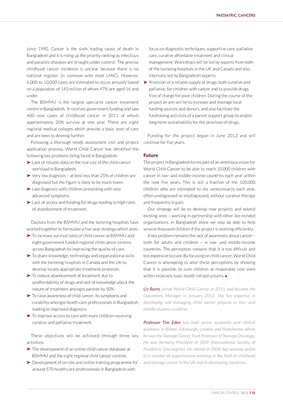
PAEDIATRIC CANCERS
since 1990. Cancer is the sixth leading cause of death in focus on diagnostic techniques, supportive care, palliative
Bangladesh and it is rising up the priority ranking as infectious care, curative affordable treatment and clinical
and parasitic diseases are brought under control. The precise management. Workshops will be led by experts from both
childhood cancer incidence is unclear because there is no of the twinning hospitals in the UK and Canada and also
national register (in common with most LMIC). However, internally led by Bangladeshi experts.
6,000 to 10,000 cases are estimated to occur annually based ‰ Provision of a reliable supply of drugs, both curative and
on a population of 143 million of whom 47% are aged 16 and palliative, for children with cancer and to provide drugs
under. free of charge for poor children. During the course of the
The BSMMU is the largest specialist cancer treatment project an aim will be to increase and leverage local
centre in Bangladesh. It receives government funding and saw funding sources and donors, and also facilitate the
400 new cases of childhood cancer in 2011 of whom fundraising activities of a parent support group to enable
approximately 20% survive at one year. There are eight long-term sustainability for the provision of drugs.
regional medical colleges which provide a basic level of care
and are keen to develop further. Funding for the project began in June 2012 and will
Following a thorough needs assessment visit and project continue for five years.
application process, World Child Cancer has identified the
following key problems being faced in Bangladesh: Future
‰ Lack of reliable data on the real size of the child cancer The project in Bangladesh forms part of an ambitious vision for
workload in Bangladesh. World Child Cancer to be able to reach 10,000 children with
‰ Very low diagnosis – at best less than 25% of children are cancer in low- and middle-income countries each year within
diagnosed but the figure is likely to be much lower. the next five years. This is still a fraction of the 100,000
‰ Late diagnosis with children presenting with very children who are estimated to die unnecessarily each year,
advanced symptoms. often undiagnosed or misdiagnosed, without curative therapy
‰ Lack of access and funding for drugs leading to high rates and frequently in pain.
of abandonment of treatment. Our strategy will be to develop new projects and extend
existing ones – working in partnership with other like-minded
Doctors from the BSMMU and the twinning hospitals have organizations. In Bangladesh alone we may be able to help
worked together to formulate a five year strategy which aims: several thousand children if the project is working efficiently.
‰ To increase survival rates of child cancer at BSMMU and A key problem remains the lack of awareness about cancer –
eight government funded regional child cancer centres both for adults and children – in low- and middle-income
across Bangladesh by improving the quality of care. countries. The perception remains that it is too difficult and
‰ To share knowledge, technology and organizational skills too expensive to cure. By focusing on child cancer, World Child
with the twinning hospitals in Canada and the UK to Cancer is attempting to alter these perceptions by showing
develop locally appropriate treatment protocols. that it is possible to cure children at reasonable cost even
‰ To reduce abandonment of treatment due to within relatively basic health infrastructures. l
unaffordability of drugs and lack of knowledge about the
nature of treatment amongst parents by 50%. Liz Burns joined World Child Cancer in 2011 and became the
‰ To raise awareness of child cancer, its symptoms and Operations Manager in January 2012. She has expertise in
curability amongst health care professionals in Bangladesh developing and managing child cancer projects in low- and
leading to improved diagnosis. middle-income countries.
‰ To improve access to care with more children receiving
curative and palliative treatment. Professor Tim Eden has held senior academic and clinical
positions in Bristol, Edinburgh, London and Manchester where
These objectives will be achieved through three key he was the Teenage Cancer Trust Professor of Teenage Oncology.
activities: He was formerly President of SIOP (International Society of
‰ The development of an online child cancer database at Paediatric Oncologists). He retired in 2008 but remains active
BSMMU and the eight regional child cancer centres. in a number of organizations working in the field of childhood
‰ Development of on-site and online training programme for and teenage cancer in the UK and in developing countries.
around 570 health care professionals in Bangladesh with
CANCER CONTROL 2013 115